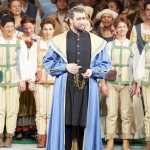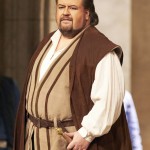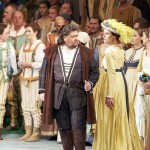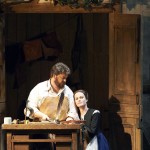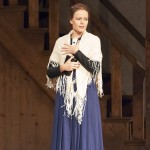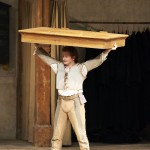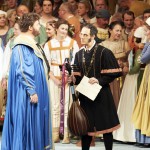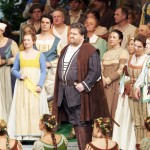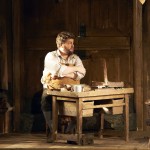But The Mastersingers is also a love story. And set in the 16th century, Wagner’s most human, and humanist, opera is also a comedy.
In Otto Schenk’s famous staging, Act 1 opens to a huge hall, with – if you can see backstage – a recessed chapel, filled with worshippers. Walther (Johan Botha) looks bemused, anxious- waiting for Eva, daughter of the rich Pogner. Eva (Christina Carvin), tall and elegant, with short coiffed hair, in a simple navy dress, is a soprano of refinement. Accompanied by her maid Magdalena, she makes eye contact with Walther. There’s is an immediate symbiosis. Botha has a lyrical, expressive tenor; standing behind her, with his powerful arms around her, will do anything for her. And it transpires Eva’s father Pogner (Ain Anger), a benefactor, is putting up his house and daughter- if she agrees- as prize to the winner of the song contest.
And it is David who’s assigned to initiate Walther. David (Norbert Ernst), a light, virtuoso tenor, is over-confident and cock-sure. There’s a bouncy, orchestral counterpoint to underline the comic element, as David explains the guild’s regulations- singing non-stop for a marathon 15 minutes. While he’s singing, apprentice carpenters are erecting the chamber for the Mastersinger’s ceremonial meeting. The stage is bustling with young carpenters in tight breeches. David is ‘the cleverest of them all’, they mock him, while he’s still singing to Walther.
Pogner- (Ain Anger’s) bass the deepest of the twelve Mastersingers – announces his prize, offering his only child. Sachs (James Rutherford) interjects: women’s taste is at odds with their masters, more in tune with the people’s: let them decide.
Walther is allowed an opportunity to sing to introduce himself. The last of his ‘line’, he sings of spring meadows, freed from frost. Botha, with his soaring lyricism, could (happily) sing us the Nuremberg telephone directory.
Second verse, he sings about birds swooping and shrieking- while Beckmesser (Adrian Eröd) constantly heckles him. As Botha begins to extoll his lover’s beauty, there’s mayhem. They warn him to learn from the rule book. Walther’s song lacks form, colaratura.
Conductor Simone Young (Austrian Radio interview) likened Wagner’s Die Meistersinger to Falstaff, Verdi’s only comedy. Certainly Act 2 is ‘Shakesperean’ in the rich characterisation, and also the situation comedy. The stage is now a spectacular recreation of a Nuremberg courtyard, with Pogner’s brown-cream thatched house on one side, facing Sachs’ cottage workplace, with village greenery centre-stage. The apprentices – very jolly for Wagner- are quietened by Sachs at work. Pogner and his daughter (sitting together on a bench): Tell me ‘dein Herzenshlag’, the man you want. ‘Must it be a master?’ she sings – meaning Walther. Sachs is at his workbench. He’s a poor ‘einfaltig‘-simple-minded man, can’t measure what he finds. Rutherford sings with expressive intensity. Eva appears; her tight shoes are ready. ‘ He’s too old for her, thinks he’s had a wife, and children enough.’
The scene between Walther and Eva is magical . Walther sings how he was despised by the Masters, begs her to come away with him: there’s no hope for him there, ridiculed by the guilds.
Now Beckmesser appears centre-stage to sing with his lute- playing Romeo serenading before Eva’s window. In the comedy- unexpected for Wagner- Beckmesser wants to listen to (and steal) Walther’s third verse. Magdalena dresses as Eva to deceive Beckmesser, while Walther and Eva , dressed as her maid are hidden (other side of stage).
So the comedy is that Beckmesser is carousing, he thinks, Eva sitting in Eva’s window, his lute accompanied by Sachs’ cobbling banging. But Beckmesser- who’s punched David in a misunderstanding- has woken up the entire neighbourhood. So the stage is filled with a cast in white nightshirts and caps. Then apprentices are fighting each other front of stage, and everyone joins in, as the noise and commotion reach such a climax. A wild-west brawl in Nuremberg, fantastically choreographed. As Walther and Eva reappear, they’re whisked away. The stage is cleared before the nightwatchman does his rounds. ‘The clock has struck eleven, beware of spooks!’
The prelude to Act 3 strikes a solemn note -characteristically Wagnerian- on unaccompanied strings: Sachs’ ‘resignation theme’. Sachs’ monologue ‘Wahn, Wahn, überall Wahn’ (Folly, illusion everywhere! People are fighting one another, but it’s their own pain they hear’) is sung by James Rutherford with great feeling: but Rutherford lacks power for the great crowd scenes.
Walther appears, Rutherford and Botha very fine in their key scene. Have you a Mastersong, asks Sachs. Tell me your dream; all poetry is nothing but the true interpretation of dreams. Walther ‘sings’ his dream, but dictates the words; and Sachs is deeply moved. If Walther can sing by the rules, then he’s really a Master.
As Beckmesser, Adrian Eröd is a tour-de-force. Eröd staggers across the stage,(bruised by David), in black with orange beading, looks devilishly creepy with long side-burns. The poem, where is it? Walther’s poem – Sachs’s ink still fresh- is purloined by Beckmesser. Sachs calls him malicious; but, philosophically, everybody has their moment of weakness. Eva will make young and old desire her.
The entrance of Eva- Christina Carvin’s exquisite soprano-is like fresh spring water in this turgid man’s world. She complains her shoe hurts. She’s on a plinth, fitted by a kneeling Sachs, as Walther enters opposite stage looking perplexed. Walther is persuaded to sing the third verse of his ‘mastersong’. Eva is reduced to tears, while Sachs conceals his feelings by singing a cobbler’s song. Eva consoles ‘Sachs, my friend, you dear man’. He made her blossom, think nobly and freely. She would choose him, if she could. (But to the strains of Tristan und lsolde, Sachs ‘will be no King Mark’.)
The ensemble playing is excellent. David and Magdalena enter, David accepted as journeyman by an anxious Sachs. Eva begins ‘the quintet’- each character expressing his or her feelings within the ensemble.
The carnival pageant filling Vienna State Opera’s cavernous stage is a colourfest. The guild members march in, carrying their banners, each singing their song. Tremendous enthousiasm from crowds lining double-decker platforms side of stage. Apprentices dance front of stage until the entry of the masters; women in traditional floral costumes perform folk dances. Sachs in blue silk cloak nervously beholds the stage with rows and rows of singers; the contest is a demonstration of the high regard Nuremberg accords Art and its masters.
In Otto Schenk’s marvelous production, the comedy pricks the potential over-pomposity of the occasion. Eröd’s awkward Beckmesser -villainous all in black- can’t decipher his stolen poem. (The crowd ‘wouldn’t want him for their daughters’). The medieval X Factor begins. Beckmesser is laughed off. Was that Sachs’ poetry? Not his. Walther will sing it. Botha takes the platform: sings (sublimely) to Eva ‘in paradise’. Walther improvises the last stanza, singing by heart, from the heart.
Walther wins the crown , but at first scorns Pogner’s honorary membership of the Guild. Sachs entreats, Don’t despise the Masters, honour Art. Perhaps, at this point- with hundreds on stage- Rutherford’s fine voice doesn’t project enough?
I was priviliged with a full view of this spectacular stage: to observe redoubtable Simone Young conducting Vienna State Opera Orchestra and Chorus. Above all to experience a near perfect cast bring to life very human characters, in comedy that shows an unexpected, even endearing, side to Wagner.
P.R. 23.11.2012
Photos: Ain Anger (Pogner); Johan Botha (Walther von Stolzing); Johan Botha and Christina Carvin (Eva); James Rutherford (Sachs) and Christina Carvin (Eva); Christian Carvin; Norbert Ernst (David); James Rutherford (Sachs) and Adrian Eröd (Beckmesser); Johan Botha; James Rutherford (Sachs)
(c) Wiener Staatsoper/ Michael Pöhn

